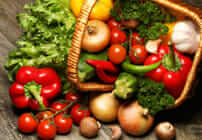The Dirt on Clean Eating by Jo Brielyn
On your journey to lose weight, get in better shape, or simply live healthier, you’ve no doubt heard the advice to “eat clean” from someone. Clean eating. The phrase seems logical enough. Who would prefer to eat dirty food anyhow, right? But, seriously, what is the real idea behind clean eating? Here’s the dirt…
First of all, let’s clarify what eating clean is not. It is not a fad or a “lose weight fast” diet. It’s not an elaborate eating plan that only people with loads of time or a personal chef can maintain. It isn’t a business ploy to get consumers to spend a lot of money purchasing special kitchen equipment or shopping in expensive specialty stores. In fact, clean eating is not a new concept at all.
The concept behind clean eating is a pure and simple one. Eat more whole foods and less packaged and/or processed items. “In some ways,” says Dr. David Katz, director of the Yale University Prevention Research Center, “clean eating is what eating was always about.” He goes on to explain, “Food that’s clean is food that’s, for the most part, real food and not encumbered with things that compromise health: artificial flavorings, artificial colorings, sugar substitutes.” Of course, as with anything else, there will be varying degrees. Some people choose to avoid all processed foods, others work on severely limiting them. Many will eat lean meats only supplied by a butcher or ones they’ve prepared themselves. Others may opt to cut out all meats from their diet. Regardless, the underlying theme to clean eating is to try to use foods in their purest, most natural forms.
Why Eat Clean?
So, while that all sounds reasonable, you may find yourself asking “Why should I go through the extra effort to eat clean when fast food and already-prepared meals save me time? What’s in It for me?”
Foods still in their natural states offer the most nutrients. When you eat clean, you give your body more minerals, vitamins, antioxidants, etc. to use to take care of you. The result? You will find that your body returns the favor by burning more fat, aiding in weight loss, increasing energy levels, fighting illnesses better, having healthier skin and hair, just to name a few.
The bottom line… the better you care for your body the better it can care for you.
Here are a few tips to help you eat cleaner:
1. Focus on foods with fewer ingredients. Stick to food items that have an ingredient list no longer than 4 to 6 items, the fewer the better. More ingredients usually indicates that it is a man-made item not a natural one. And, a good rule to remember is that if you can’t even pronounce it or know what it is, don’t put it into your body.
2. Eat more fresh fruits and vegetables. Most of us have parents who have been telling us this since childhood. So, yes, listen to Mom and Dad and eat your veggies and fruits! Try to choose fresh options over canned or processed ones. They come straight from nature and are packed with nutrients without all the added ingredients your body doesn’t need.
3. Nix the sodas and sugary drinks and limit alcohol consumption. While small amounts of alcohol can offer health benefits like raising “good” HDL cholesterol and acting as a blood thinner, too much alcohol also affects your liver, dehydrates your body, and adds unnecessary calories to your diet. Soda and other sugary drinks don’t offer any beneficial nutrients. Instead, they simply pile on extra sugar and calories. Try to replace them with water and green tea. Water is vital for your body, its helps circulate oxygen, and gets rid of toxins. Green tea provides a multitude of benefits, including building immunity, burning fat, and fighting cancer and other diseases.
4. Swap whole grains for refined grains. Beneficial fiber, vitamins and minerals have been removed from refined grains like white flour and white rice, so they add calories but not many nutrients. Since refined grains are low in fiber, they are also less successful at satisfying hunger than whole grains. Make sure labels on rice, pasta, breads, and other grains say “100% whole grain” and don’t have a bunch of other ingredients added. These whole grains are still complex and haven’t been broken down, so you will get the most out of your grain servings with them.
5. Skip the processed items and fast food. They often contain a lot of sugar, sodium, fats, and extra calories that you can do without. Although these types of meals may be quicker, a little bit of “clean” food preparation on your part will go a long way to benefiting your body.
Eating clean will take some practice and adjustment time, especially if you have never eaten that way before. You might choose to ease your way into eating “100% clean” by introducing one or two clean meals into your daily diet each week. Foods in their natural and unprocessed state taste differently than processed ones. You may have to give your taste buds time to adjust and experiment with new foods, preparation methods and recipes that appeal to you. You will also find that it does require more kitchen time to plan and cook meals, at least initially, but the benefits your body will gain by your clean diet will be worth the efforts.
JO BRIELYN is an author and contributing writer for Get Fit Now and has currently completed 16 nonfiction books about health and wellness. Jo is the founder, writer, and editor of Creative Kids Ideas, a resource website that supplies parents, teachers, and family members with the tips and fun ideas to help build stronger, happier, and more creative kids. She is also the writer behind Good-For-Your-Health.com. Jo is a veteran of the United States Air Force and a former youth leader. She resides in Central Florida with her husband and their two daughters. Jo is the co-author of Combat Fat for Kids.





